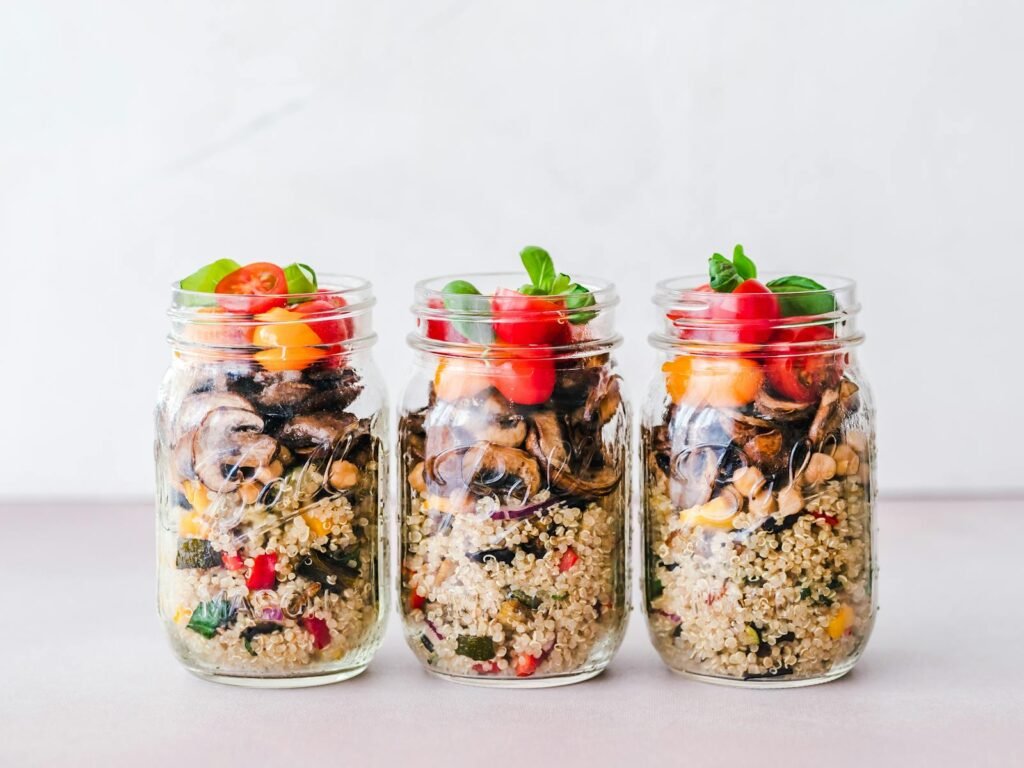Polycystic ovary syndrome (PCOS) affects many women’s health. Eating the right foods can help manage symptoms. Low glycemic index foods may improve insulin sensitivity in women with PCOS. This can make a big difference in how you feel day-to-day.
A low glycemic index diet focuses on foods that don’t cause quick spikes in blood sugar. This type of eating plan may help with PCOS symptoms like irregular periods and weight gain. It can also lower the risk of diabetes, which is common in women with PCOS.
Some good low glycemic index foods for PCOS include whole grains, leafy greens, and berries. These foods can help balance your hormones and make you feel better. Changing to a low glycemic index diet could improve your PCOS symptoms without needing to count calories or feel hungry all the time.
Understanding PCOS and Its Relationship with Diet
PCOS affects your body’s hormone balance and metabolism. Your diet plays a big role in managing PCOS symptoms. Eating the right foods can help control insulin and blood sugar levels.
The Role of Insulin Resistance in PCOS
Insulin resistance is common in women with PCOS. Your body makes insulin, but it doesn’t work well. This leads to high blood sugar and insulin levels.
When insulin doesn’t work right, it can cause:
- Weight gain
- Irregular periods
- Acne
- Excess hair growth
Your diet can help improve insulin resistance. Eating foods that don’t cause big spikes in blood sugar is key. This helps your body use insulin better.
Importance of Low Glycemic Index Foods
Low glycemic index (GI) foods are good for PCOS. These foods don’t raise your blood sugar quickly. They help keep your insulin levels steady.
Some benefits of low GI foods for PCOS:
- Better weight control
- More regular periods
- Less inflammation
- Improved hormone balance
Examples of low GI foods:
- Whole grains
- Beans
- Most fruits and vegetables
- Nuts
Eating these foods can help manage your PCOS symptoms. They make it easier for your body to use insulin. This can improve your overall health with PCOS.
Dietary Strategies for Managing PCOS
Eating the right foods can help manage PCOS symptoms. A balanced diet with whole grains, lean proteins, and plenty of fruits and vegetables is key. These choices can improve insulin sensitivity and reduce inflammation.
Incorporating Whole Grains and Fiber-Rich Foods
Whole grains and fiber are great for PCOS management. They help control blood sugar and keep you feeling full. Try swapping white bread for whole grain options. Brown rice, quinoa, and oats are good choices.
Fiber-rich foods like beans and lentils are also helpful. They slow down digestion and prevent blood sugar spikes. Aim for at least 25 grams of fiber daily. Here’s a simple list to get you started:
- Oatmeal
- Brown rice
- Whole wheat pasta
- Chickpeas
- Black beans
Add these foods to your meals gradually. This helps your body adjust and avoid digestive discomfort.
Choosing the Right Types of Protein
Protein is important for managing PCOS. It helps balance hormones and keeps you satisfied. Focus on lean proteins to avoid extra saturated fat. Good options include:
- Chicken breast
- Fish (like salmon or tuna)
- Turkey
- Tofu
- Egg whites
Plant-based proteins like beans and lentils are also great choices. They’re high in fiber and low in fat. Try to include protein in every meal. This helps stabilize blood sugar levels.
Avoid processed meats like bacon or sausage. These can increase inflammation in your body. Instead, opt for fresh, unprocessed protein sources when possible.
Fruits and Vegetables for a Balanced PCOS Diet
Fruits and vegetables are packed with nutrients that help manage PCOS. They’re low in calories but high in fiber and antioxidants. These foods can improve insulin sensitivity and reduce inflammation.
Aim for a variety of colors on your plate. Each color offers different health benefits. Here are some top picks:
- Leafy greens (spinach, kale)
- Berries (strawberries, blueberries)
- Cruciferous veggies (broccoli, cauliflower)
- Citrus fruits (oranges, grapefruits)
Try to fill half your plate with fruits and vegetables at each meal. This ensures you’re getting plenty of nutrients. Remember, fresh or frozen options are both good choices.
Limit fruit juice, as it’s high in sugar without the fiber. Whole fruits are always a better option for managing PCOS symptoms.
Recommended Foods for PCOS with Low Glycemic Index
A low glycemic index diet can help manage PCOS symptoms. These foods can keep your blood sugar steady and improve insulin sensitivity.
Nourishing Vegetables and Fruits
Eating vegetables and fruits is great for PCOS. Spinach is packed with iron and fiber. It’s easy to add to salads or smoothies. Tomatoes have lycopene, which may help with inflammation. Try them raw or cooked in various dishes.
Carrots are sweet but low in sugar. They make a perfect snack. Apples and pears are fiber-rich fruits that won’t spike your blood sugar. They’re portable and satisfying. Cherries are another good choice. They’re tasty and may help reduce inflammation.
Choose these colorful options:
- Leafy greens (spinach, kale, lettuce)
- Cruciferous veggies (broccoli, cauliflower)
- Berries (strawberries, blueberries)
- Citrus fruits (oranges, grapefruits)
Beneficial Fats and Oils
Good fats are important for hormone balance. Olive oil is a healthy choice for cooking and dressings. It’s rich in monounsaturated fats that can help with insulin sensitivity.
Omega-3 fatty acids are great for PCOS. You can find them in:
- Fatty fish (salmon, sardines)
- Walnuts
- Chia seeds
- Flaxseeds
These fats may help reduce inflammation and improve your overall health. Try to include them in your meals regularly. A tablespoon of chia seeds in your morning yogurt or a piece of grilled salmon for dinner are easy ways to boost your intake.
Smart Carbohydrate Choices
Picking the right carbs is key for managing PCOS. Oats are a great breakfast option. They’re filling and can help control blood sugar. Quinoa is a protein-rich grain that’s versatile for many meals.
Brown rice is a better choice than white rice. It has more fiber and nutrients. Barley is another good grain to try. It’s chewy and satisfying.
Here’s a quick guide to smart carbs:
- Choose whole grains over refined ones
- Pair carbs with protein or fat to slow digestion
- Watch portion sizes
Remember, everyone is different. Pay attention to how foods affect you. Keep a food diary to track what works best for your body and PCOS symptoms.
Additional Considerations for a PCOS-Friendly Diet
A PCOS-friendly diet goes beyond just choosing low glycemic index foods. It involves careful meal planning and lifestyle changes that work together to manage symptoms and improve overall health.
Meal Planning and Preparation
Planning your meals ahead of time can help you stick to a PCOS-friendly diet. Start by creating a weekly meal plan that includes a variety of low glycemic index foods. Make a shopping list to ensure you have all the ingredients on hand.
Prep your meals in advance to save time during busy weekdays. Cook large batches of proteins and vegetables that you can mix and match throughout the week. Store them in portion-sized containers for easy grab-and-go meals.
Consider using a slow cooker or instant pot for convenient, healthy meals. These tools are great for making soups, stews, and one-pot dishes that are packed with nutrients and low in glycemic impact.
Lifestyle Factors That Complement Dietary Changes
Your diet works best when combined with other healthy habits. Regular exercise is key for managing PCOS symptoms. Aim for at least 30 minutes of moderate activity most days of the week. This can include walking, swimming, or yoga.
Staying hydrated is also important. Drink plenty of water throughout the day. This can help control hunger and support overall health.
Weight management is often a focus for those with PCOS. A balanced diet and regular exercise can help you reach and maintain a healthy weight.
Some people find that intermittent fasting helps manage their PCOS symptoms. However, it’s important to talk to your doctor before trying any new eating patterns.
Frequently Asked Questions
Many people with PCOS want to know how low glycemic index foods can help manage their symptoms. These questions cover key aspects of using a low GI diet to improve PCOS.
What are the most beneficial low glycemic index foods for managing PCOS symptoms?
Some of the best low GI foods for PCOS include:
- Leafy greens like spinach and kale
- Berries such as strawberries and blueberries
- Nuts and seeds
- Lean proteins like chicken and fish
- Whole grains such as quinoa and oats
These foods help keep your blood sugar stable and may reduce PCOS symptoms.
Can consuming low GI fruits aid in weight loss for individuals with PCOS, and if so, which ones are recommended?
Yes, low GI fruits can help with weight loss if you have PCOS. Good choices include:
- Berries (strawberries, blueberries, raspberries)
- Apples
- Pears
- Oranges
- Peaches
These fruits are high in fiber and nutrients but won’t spike your blood sugar.
How does a Low GI diet impact insulin resistance and weight management in PCOS patients?
A low GI diet can improve insulin resistance and help with weight management in PCOS. It does this by:
- Keeping blood sugar levels steady
- Reducing insulin spikes
- Helping you feel full longer
- Supporting healthy metabolism
This can make it easier to lose weight and manage PCOS symptoms.
What are some effective dietary strategies for losing weight with PCOS while adhering to a low glycemic index regime?
To lose weight with PCOS on a low GI diet:
- Eat small, frequent meals to keep blood sugar stable.
- Include protein with each meal and snack.
- Fill half your plate with non-starchy veggies.
- Choose whole grains over refined carbs.
- Stay hydrated with water and unsweetened drinks.
These steps can help you feel full, reduce cravings, and support weight loss.
Which foods should be avoided by those with PCOS due to their high glycemic index?
If you have PCOS, try to avoid these high GI foods:
- White bread and pasta
- Sugary snacks and drinks
- White rice
- Potatoes (especially mashed)
- Breakfast cereals with added sugar
These foods can cause rapid blood sugar spikes, which may worsen PCOS symptoms.
Could you provide a brief outline of a weekly low glycemic index meal plan suitable for PCOS patients?
Here’s a sample low GI meal plan for PCOS:
Monday:
- Breakfast: Greek yogurt with berries and nuts
- Lunch: Grilled chicken salad with mixed greens
- Dinner: Baked salmon with quinoa and roasted vegetables
Tuesday:
- Breakfast: Vegetable omelet with whole grain toast
- Lunch: Lentil soup with a side salad
- Dinner: Turkey meatballs with zucchini noodles
Wednesday:
- Breakfast: Overnight oats with chia seeds and sliced apple
- Lunch: Tuna salad in lettuce wraps
- Dinner: Grilled tofu with brown rice and steamed broccoli





